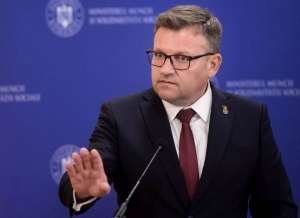The free movement of people in the Schengen area may be temporarily restricted, directed and justified by the member states by reintroducing border controls, according to the report adopted by the members of the Commission for Civil Liberties (LIBE) of the European Parliament regarding the reform of the Community acquis regarding that space. In other words, the Schengen area will no longer be as free as it was before the pandemic, when the member states will consider, for various valid reasons, that it is necessary for a period to introduce border controls. In practice, it can be said that the European Union, through these measures, is destroying the foundation on which the Schengen area was founded.
The draft report adopted by LIBE Commission members contains strict deadlines for the reintroduction of internal border controls for member states, as well as clear provisions indicating how long they can be maintained. Thus, for unforeseen threats, border control can be introduced for one month and extended to a maximum of three months. In the case of foreseeable threats, border checks will be reintroduced for three months, a period that can be successively extended by another three months, but not more than one year.
If a member state intends to renew internal border control after three months, it will send a risk assessment to the European Commission. If the member state wants to extend the border check for a period longer than six months, the measure will be able to be taken only with the opinion issued by the European Commission regarding the necessity and proportionality of such control.
The European Commission's initiative on reforming the Schengen area came after the pandemic crisis, as it wants to ensure a coherent response of the EU bloc in cases of large-scale cross-border public health emergencies, allowing temporary restrictions on entry into the Schengen area, but exempting from these are EU citizens, long-term residents and asylum seekers.
As an alternative to border controls, the new rules would promote police cooperation in border regions. If third-country nationals with irregular status are apprehended during joint patrols and there is evidence that they have arrived directly from another EU country, these persons can be transferred to that country if it participates in joint patrols. MEPs want the exclusion of several categories of people from return, including unaccompanied minors.
At the same time, MEPs propose removing certain concepts related to migration from the proposal. They argue that provisions on the instrumentalization of migrants (where third countries facilitate or encourage migrants to cross EU territory with the aim of destabilizing countries) should be covered by a separate, dedicated proposal that EU lawmakers are currently discussing .
• Three Romanian MEPs voted for the adoption of the report
In the adopted report, MEPs propose clear criteria for the imposition of border controls in response to serious threats that endanger the functioning of the Schengen area. There would have to be a justifiable reason, such as an "identified and immediate" terrorist threat, with stricter time limits for border controls in response to foreseeable threats, up to a maximum of eighteen months. If the threat persists, more border controls could be authorized by a Council decision.
The proposals would also allow border controls to be reintroduced in several countries when the Commission receives notifications of a particularly serious threat affecting most countries simultaneously, for a period of up to two years.
Among the 39 members of the LIBE Commission who voted for this report are MEPs Vasile Blaga, Rareş Bogdan and Dacian Cioloş.
Political sources told us that the positive vote of the three Romanian members of the LIBE Commission was expressed on the grounds that the adopted amendments reduce the negative impact of the initial proposal formulated by the European Commission and that once the Schengen area is reformed, by strictly establishing the situations in which it can control be reintroduced at borders, there will no longer be any reason for any EU member state to oppose our country's access to the area of free movement of persons.
In the proposal to reform the Schengen area submitted to the European Parliament in 2021 by the Community Executive, the EC decided to introduce new provisions to regulate a serious threat to public order or internal security, which would endanger the general functioning of the area without controls at internal borders, which would make it possible to adopt a Council decision on the reintroduction of internal border controls in several Member States at the same time.
The members of the LIBE Commission claim that such a mechanism can be accepted, but believe that it should be strictly regulated. The reintroduction of EU-wide border controls should be possible for periods of six months, renewable up to a maximum of two years. This requires a proposal for a Council decision from the Commission. But before taking a decision, the Council should consult the European Parliament.
We remind you that in a decision handed down in the spring of this year, the Court of Justice of the European Union decided that the reinstatement - due to serious threats - of checks at the internal borders of the EU member states cannot exceed six months and can be extended only when it appears a new threat, unless there are exceptional circumstances that endanger the overall functioning of the Schengen area.
• From two-speed EU to a four-tier Union
Not only the Schengen area will be reformed, but also the European Union according to a study commissioned by Germany and France and presented by the British publication The Guardian.
Basically, from the concept circulated before the pandemic - a Europe with two or three speeds - it seems that the economic engine of the community block, engine made up of France and Germany, is thinking of a European Union with four levels, which would also allow the states third parties wishing to join have links with the European community.
Among the four types of EU members, the Franco-German study also proposes a simple Union in which Great Britain, which left the EU block following Brexit, can also participate.
According to the experts from Paris and Berlin, who were part of the 12-person working group, the first level of the EU would be a hard core that would include the states that are members of both the Eurozone and the Schengen area.
Around the hard core would gravitate in the first concentric circle the rest of the member states of the European Union, and the second circle would also include the "associated members" as Ukraine and the Republic of Moldova would become in the first phase, but also the states participating in the single market, such as Norway, which is in the European Economic Area with access to the trade bloc.
According to this construction, Romania would be part of the first concentric circle, in order of importance, until the accession to the Schengen area and the Euro zone.
The fourth tier would include third countries such as the UK and would involve "political cooperation without the obligation to comply with EU law".
The study comes after Britain's opposition leader Keir Starmer told French President Emmanuel Macron he wants to build a "stronger" relationship between the two countries if he wins national elections due next year.
• Limiting the right of veto - a reform proposed by the Franco-German bloc
The reform of the European Union is imposed by the desire of the institutions in Brussels to go from 27 members, as the community block currently has, to 36 member states. The Franco-German study calls on EU institutions to adopt a series of reforms to be ready by 2030 to accept new members such as Ukraine and the Republic of Moldova.
Among the proposed reforms is a shift from unanimity to qualified majority voting in key areas such as taxation, finance and foreign affairs. This would require changes to the European treaties, which will have to be approved by referendum in some member states.
As for the qualified majority, the study proposes to redefine it to 60% of the member states representing 60% of the population of the Union (compared to 55% of the countries representing 65% of the population, as it is currently).
Another proposed measure is that the right of veto can only be an exception and not a rule as it is currently at the level of the EU Council and the European Council. Experts believe, according to the French daily Les Echos, that this measure is imposed through the lens of Hungary's attitude, which, from the beginning of the war in Ukraine until now, has demonstrated that it does not hesitate to use its right of veto. The transformation of the dora into an exception of this right of veto would, however, help our country to access the Schengen area, because fully meets all the technical criteria provided for in the acquis communautaire.
According to the French source cited, experts recommend maintaining the current number of MEPs, 751, which would require a new division among member states, after EU enlargement. The study also foresees the reduction of bureaucracy within the European institutions in Brussels, by reducing the number of commissioners proposed by the member states in the EU Executive. If some member states won't agree to change EU treaties, then experts say a "coalition of the willing" could press ahead with reforms in a new "inner circle" of countries.
A controversial chapter is that of offering a gradual enlargement of the EU to the candidate states, an enlargement that could give these states the opportunity to participate in certain policies before their official accession.
The quoted document was presented on Tuesday at the meeting of the foreign ministers of the EU member states of European affairs, which took place in Brussels, but it was not welcomed favorably by all the participants, some of them, including the Spanish minister Pascual Navarro, arguing that the proposed text does not solve the main problems facing the EU bloc.
The conclusions of the study would be debated at the informal European Council on October 6, which will take place in Spain, before the summit on December 14 and 15, where the opening of accession negotiations with Ukraine and the Republic of Moldova would be officially declared.





























































